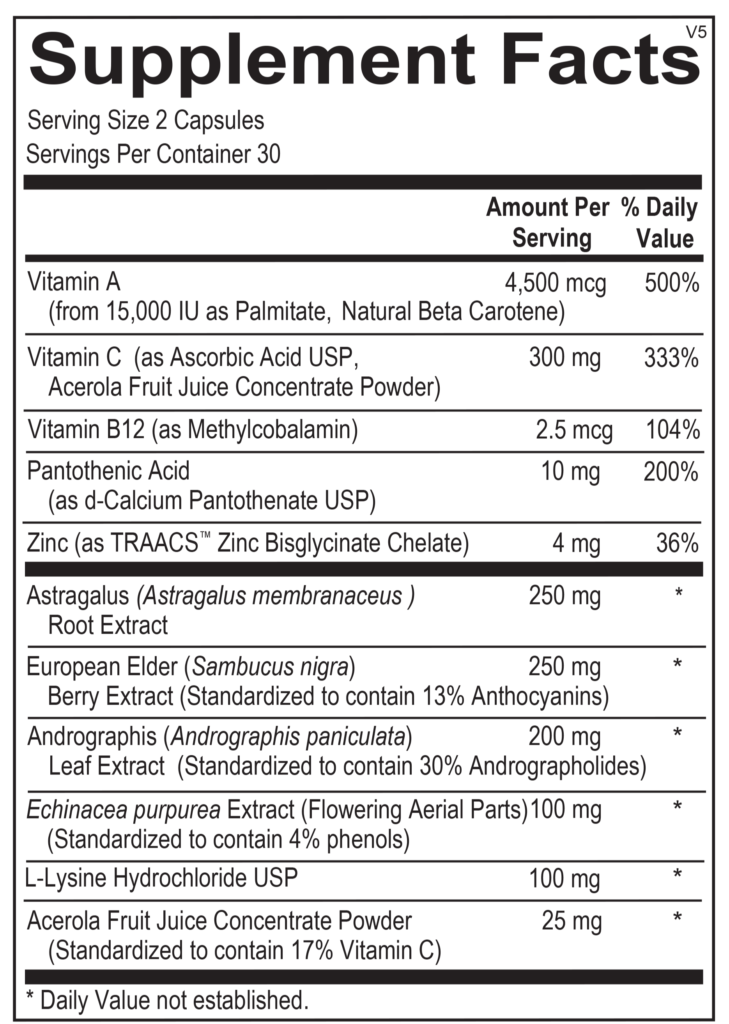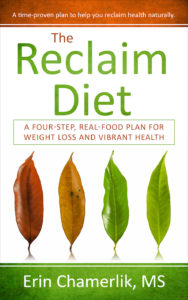
Fast-Acting Response for Immune System Challenges
Viracid boosts immune defenses by providing nutrients such as L-lysine, vitamins A and C, pantothenic acid, B12, and zinc. Viracid also includes the powerful synergistic blend of botanical extracts black elderberry, astragalus, echinacea, and Andrographis, all of which have been used traditionally for their clinically effective immune-modulating properties.
Our body’s immune system is a complex and dynamic defense system that comes to our rescue at the first sign of exposure to an outside invader. The dynamic nature of the immune system means that all factors that affect health need to be addressed in order for it to function at peak performance. The immune system is very sensitive to nutrient deficiencies. While vitamin deficiencies can compromise the immune system, consuming immune enhancing nutrients and botanicals can support and strengthen your body’s immune response.
Viracid’s synergistic formula significantly boosts immune cell function including antibody response, natural killer (NK) cell activity, thymus hormone secretions, and T-cell activation. Viracid also helps soothe throat irritations and nasal secretions, and maintains normal inflammatory balance by increasing antioxidant levels throughout the body.
Suggested Use:
- For immediate immune support: 1-2 capsules per hour or as recommended by your health care professional.
- For immune maintenance: 2 capsules per day or as recommended by your health care professional.
- Do not exceed 2 capsules every hour.
Key Ingredients in Viracid
Vitamin A
According to a 2020 article published in the journal Nutrients, an optimal immune response depends on an adequate diet and nutrition in order to keep viral infections at bay. For example, sufficient protein intake is crucial for optimal antibody production. Low micronutrient status, such as of vitamin A or zinc, has been associated with increased Covid-19 infection risk. Vitamin A deficiency is associated with increased risk of infection. In fact, it is among the most abundant micronutrient deficiencies worldwide, especially in countries with low protein and meat intake. [source]
Vitamin B12
Vitamin B12 plays an important role in viral infections. Vitamin B12 can help balance immune responses to better fight viral infections. B12, part of the B vitamin complex, is involved with the regulation of the immune system and antiviral activity. Vitamin B12 was ranked among the top 4 substances for potential use in treatment for COVID-19, on the basis of findings from a study carried out with the help of molecular modelling and virtual screening tools, using data on US Food and Drug Administration–approved drugs. [source]
Vitamin C [source]
Vitamin C, ascorbic acid, is an essential water-soluble nutrient. Humans cannot synthesize Vitamin C and must consume it in their diet and take supplemental forms to fill the nutrient gaps. A daily intake of 200 – 400mg Vitamin C is recommended. People deficient in vitamin C may be more susceptible to severe respiratory infections such as pneumonia.
“Vitamin C’s antioxidant, anti-inflammatory and immunomodulating effects make it a potential therapeutic candidate, both for the prevention and amelioration of COVID-19 infection, and as an adjunctive therapy in the critical care of COVID-19.” [source]
Cold symptoms, caused by over 100 different virus strains, some of which are coronaviruses, have been shown to be less severe and resolve more quickly with oral vitamin C.
Vitamin C is an important therapeutic agent in reducing viral load with oral supplementation in the range of 2–8 g/day to help attenuate the conversion to the critical phase of COVID-19. Take Vitamin C in divided doses every three to four hours.
Vitamin B5, Pantothenic Acid
Vitamin B5, or pantothenic acid, is one of the B complex vitamins that aids in the formation of antibodies that the immune system produces against invaders like parasites, bacteria, and viruses. It is water soluble and leaves the body quickly.
Zinc [source]
The trace element zinc is vital for the development and function of the immune system. Zinc protects the body from virus entering and it directly inhibits viral replication.
“Zinc supplementation decreases viral replication, preserves antiviral immunity, attenuates the risk of hyper-inflammation, supports anti-oxidative effects and thus reduces lung damage and minimized secondary infections.”
Studies have shown reduced symptom severity, reduced frequency, and duration of the common cold after zinc administration.
A 2020 review study stated, “As zinc deficiency results in altered numbers and dysfunction of all immune cells, subjects with suboptimal zinc state have an increased risk for infectious diseases, autoimmune disorders, and cancer. In addition to malnutrition, risk groups for zinc deficiency include the elderly and patients with various inflammatory and autoimmune diseases. The World Health Organization (WHO) assumes that at least one third of the world population is affected by zinc deficiency. The fact that zinc deficiency is responsible for 16% of all deep respiratory infections world-wide provides a first strong hint on a link of zinc deficiency with the risk of infection and severe progression of COVID-19 and suggests potential benefits of zinc supplementation.”
Astragalus Root
Astragalus has been known to have antiviral activities. It is also has been shown to exhibit anti-inflammatory, immunostimulant, antioxidative, anti-cancer, antidiabetic and heart- and liver-protective benefits. It regulates the immune system without stimulating inflammatory cytokines. [source]
Elderberry
Black elderberry (Sambucas nigra) has a long history of traditional use among herbalists and is native to Europe, Northern Africa, and Western and Central Asia. The bioactive components of elderberry include the flavonoid anthocyanin. Viracid is standardized to include black elderberry extract with 13% anthocyanins.
Elderberry has traditionally been used to prevent and treat respiratory problems. See my recipe for making elderberry syrup at home.
“Elderberry contains anthocyanins, a subset of flavonoids which may have immunomodulating and possibly anti-inflammatory effects. Anthocyanins can attach to (and render ineffective) viral glycoproteins that enable viruses to enter host cells, thereby potentially having an inhibitory effect on viral infection.” [source]
Elderberries have shown antibacterial and antiviral activities in in vitro. Two clinical trials using a liquid elderberry extract showed a reduction in symptoms and duration of influenza infection. [source]
Elderberries are rich in polyphenols, pharmacologically active compounds. Flavonoids are a large group of polyphenols in certain plants and participate in processes such as plant pigmentation and antioxidant capacity. [source]
Quercetin is one of the phenolic compounds found in elderberries and it is a well-known zinc ionophore—it can help zinc get into the cells to inhibit viral replication.
Andrographics paniculata
Andrographis paniculata is a plant that has been used in Asian medicine for centuries. Traditionally, the plant has been used as an infusion, decoction or powder, either alone or in combination with other herbal plants. A. paniculata has been reported to provide strong antioxidant support due to its ability to activate highly protective antioxidant reactions including superoxide dismutase, catalase and glutahtione-S-transferase.
Andrographis paniculata, commonly known as the “King of Bitters,” is an important medicinal plant in both Ayurvedic and traditional Chinese medicine for treating various ailments such as the common cold. It has been used to treat respiratory infections and improve immunity. It has anti-inflammatory and anti-bacteria properties.
“The plant’s key components are called andrographolides, and they have antioxidant, anti-inflammatory, and antiviral properties. As a result, andrographis can be used to treat diseases and alleviate the symptoms of the common cold and influenza.” [source]
Echinacea
Echinacea purpurea is a perennial herb that has been used for centuries in Native American medicine. Current research has supported echinacea’s clinical applications as this botanical has been the subject of more than 300 scientific studies. Echinacea activates multiple aspects of immune function, including enhancing leukocyte and granulocyte counts, activating neutrophils, monocytes, and eosinophils and solubilizing immune complexes.
Echinacea has antiviral activity against influenza viruses and has traditionally been used for treatment of colds and flu. It is effective for treating upper respiratory tract infections. [source]
“This study investigated the efficacy of Echinacea for the prevention of viral respiratory tract infections, for the prevention of secondary bacterial complications and for reducing rates of antibiotic prescriptions in children. We report that use of Echinacea, resulted in significant prevention of cold days and respiratory tract infections by up to 32.5%. Benefits included a specific prevention of enveloped virus infections, including RSV and in particular a marked reduction of influenza virus infections.” [source]
L-lysine
L-lysine is an amino acid and it is a natural disease-fighting agent. It inhibits viral growth. Lysine can treat active infections and it also helps prevent viral infections.
Bill Sardi recently published that Bio-Virus Research Inc., of Reno, Nevada, has successfully treated 30 frontline doctors and nurses and 1,000-plus patients with L-Lysine to prevent and even abolish COVID-19 coronavirus. Lysine has been shown to be suppressive in both RNA and DNA viruses. [source]
Viracid combines key nutrients to support the immune system
Viracid a powerful combination of key nutrients and botanical extracts that provide support for immune challenges.*• Provides Support for Immune Challenges*
• Supports Immune Function*
• Maintains Healthy Inflammatory Balance*
The dynamic nature of the immune system means that all factors that affect health need to be addressed in order for it to function at peak performance. While vitamin deficiencies can compromise the immune system, consuming immune-supporting nutrients and botanicals can help strengthen the body’s immune response.
15% off Viracid here

Affiliate links are in this post. This is not medical advice. Consult with your physician. If you grab anything we mention using our referral links, we may get a small commission. However, there’s no cost to you.
Recommended
-
Dandelion for Liver Support and Health BenefitsJuly 20th, 2024
-
Modified Citrus PectinJuly 11th, 2024
-
Bentonite Clay Mask for Face and ArmpitsJuly 8th, 2024
-
Two Supplements for Erectile DysfunctionJune 30th, 2024










